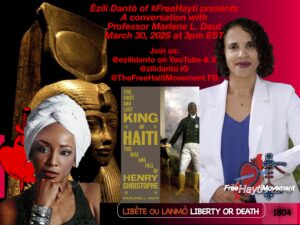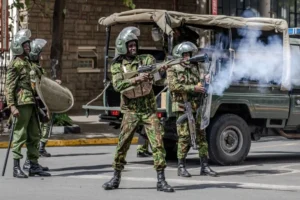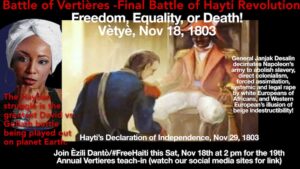 by Jacques Casimir
by Jacques Casimir
*
Une autre vision sur Jean-Jacques Dessalines
Par Jacques Casimir (Pasteur d’Amoulio), majac14@hotmail.com
(Another vision of Jean-Jacques Dessalines by Jacques Casimir)
Les Vaincus n’écriront jamais l’histoire des vainqueurs. S’ils le font, c’est d’une manière hideuse, tronquée et falsifiée, pour nous montrer qu’ils ont toujours le dernier mot. Ils ont mis en avant Toussaint Louverture captif au fort de Joux où la France a décidé de son sort
Ils l’ont surnommé le Spartacus noir, avec raison, puisque Rome a eu la t ête de Spartacus, comme Napoléon et la France ont eu celle Toussaint Louverture. Ce que la France n’avait pas compris, c’est que les racines étaient profondes et nombreuses . Pour une fois regardons l’histoire avec nos propres yeux et non pas avec ceux du colon.Exemple: Le bon vieux roi Dagobert a mis sa culotte à l’envers on ne portait pas de culottes au VII° siècle, ces dernières étant apparues vers le XVI° siècle, soit près de 1000 ans après le règne de Dagobert ». Si les français ne disent pas la vérité sur leur propre histoire. Qu’en ont-ils fait et que feront-ils de la nôtre?
Qu’en est ”il de Jean Jacques Dessalines ou Jean Jacques Des salines? Celui, sur qui la France a toujours essayé de porter ombrage, parce qu’il les a vaincus militairement. Il a forcé le général Rochambeau des Armées de Napoléon à la reddition. Qui était vraiment cet homme? Jean-Jacques Dessalines a marqué l’histoire de l’humanité, il est le premier à faire tomber le mythe de l’invincibilité de l’homme blanc . Il fut le vainqueur qui n’a pas fait de compromis et qui ne devait rien à personne. Il vécut une jeunesse particulièrement difficile. Ce fut un esclave rebelle, illetré souvent marron. Son corps, dit-on, était couvert des cicatrices laissées par les verges cloutés. Il se révolta constamment contre l’inégalité qui régnait à Saint-Domingue et se révéla d’une brutalité impitoyable. Bien que dépourvu de formation intellectuelle, c’était un homme sauvage»: C’est le point de vue colonial Français
Ordonnance concernant les salines de la colonie de St Domingue. Du 26 mai 1788 – (Port-au-Prince : Imprimerie De Mozard, 1788). Par Vincent, Alexandre De Maréchal et François Barbé De Marbois, conseiller du Roi. Ce prospectus unique, indique le départ de l’esclave Jean-Jacques Des Salines, charpentier et lettré pour les plantations à l’intérieur des terres, un agitateur rebelle qu’il faut surveiller. Donc nous savons qu’il travaillait dans les salines d’où la provenance du nom Dessalines. Et les marques sur son corps était le résultat du sel au contact avec sa peau. L’esclave n’a pas de père, il prend le nom du maître de la plantation, il a travaillé dans les salines. Donc, Des salines est devenu Dessalines.
Le manuscrit suivant indique le recensement des esclaves artisans d’où figure le nom du charpentier Jean-Jacques Des salines qui pouvait calculer la traverse et la charpente des toits. A croire ce qui est écrit, le mythe qu’il était illettré vient de tomber. (REF: Extrait des registres du Conseil Supérieur de Saint-Domingue, Du 30 janvier 1789, Port-au-Prince: Chez Bourdon, Imp. Du Roy, 1789. p.15 Note: Concerne l’obligation de l’inventaire et vérification de chaque année des relevées des registres. Donné au P-au-P. Signé par De Marbois et Fougeron. )
Pompée Valentin Baron Vastey, surnommé le Baron de Vastey, cousin d’Alexandre Dumas, est le premier historien haitien à écrire un livre sur l’histoire d’Haiti après l’indépendance en 1819 – Auteur, le baron de Vastey , titre Essai sur les causes de la révolution et des guerres civiles d’Hayti 1819 — Cette publication et certaines notes compilées de l’auteur confirment que l’empereur savait lire et écrire. Ce manuel d’histoire est considéré comme une oeuvre majeure dans l’histoire d’Haiti.Tous ces archives Rares sont consignés en plusieurs volumes dont certains sont cachés volontairement ou disparus, pour que les falsificateurs vaincus puissent continuer à diffuser que nos anc êtres qui ont mis dehors les armées de Napoléon étaient des illétrés et des sauvages. (REF: LOIS ET CONSTITUTIONS DE SAINT-DOMINGUE/VOLUME 7 par Moreau de St Méry EXTRAIT DES REGISTRES DU CONSEIL SUPÃRIEUR DE SAINT-DOMINGUE. REF: Thomas Madiou, Titre Histoire d’Haiti, tome VI, 1847.)
Une lettre diplomatique d’une valeur inestimable que Dessalines a écrit lui m ême au président Thomas Jefferson en février 1804, pour demander la reconnaissance de l’indépendance d’Haïti et l’établissement des relations diplomatiques resta sans réponse. Le président Thomas Jefferson n’y a jamais donné suite. Ce manuscrit se trouve sous scellé aux archives de la présidence des Ãtats-Unis. Il est classé hors temps. Sous aucun prétexte, personne ne peut le déclassifier.
Pour votre gouverne, il y a 3 types de documents classifiés: Les documents secrets qu’on peut déclassifier après 50 ans. Les documents top secrets, généralement militaires, rarement déclassifiés. Les documents classifiés hors temps, sous scellés, que nul ne peut jamais déclassifiér pour raisons d’Ãtat.
Jefferson était un anti-haïtien notoire reconnu. Il avait aligné les puissances européennes, dans un effort pour isoler Haïti. Ainsi, son administration a envoyé de l’aide pour les blancs français de St Domingue bien avant de de débattre de l’opportunité de l’embargo des Ãtats-Unis sur Haïti. Ce qui fut imposé en 1805. Il a initialement exprimé au chargé d’affaires français Louis A. Pichion, envoyé par Talleyrand pour entreprendre une campagne de désinformation contre Dessalines, à savoir : que les Ãtats-Unis étaient opposés a l’indépendance de l’ile sous domination noire. «Je voudrais voir, disait-il, que l’autorité de la France soit rétablie à Saint-Domingue». (REF: Matthewson, Tim (Summer 1982). REF: Auteur Abraham Bishop, Titre “The Rights of Black Men,” and the American Reaction to the Haïtian Revolution. The journal of negro REF: Auteur – Matthewson, Tim , Jefferson et la non reconnaissance d’Haiti Actes de l’américan philosophical society (Mars 1996). Voir: Ma chronique: Où est la malédiction..)
Le livre mentionné ci-haut en Pièces jointes, Titre: Etude et solution nouvelle de la question Haitienne par Le Pelletier De Saint-Rémy, Auditeur du Conseil d’Etat édité en Deux tomes en 1846 où l’auteur confirme sa correspondance et des lettres écrites des mains de Dessalines lui-m ême prouve encore une fois que l’empereur n’était pas un sauvage illétré. Mentionnons que Le Pelletier De Saint-Rémy, procureur du roi de France, est resté après l’indépendance et a servi comme avocat des cours impériales de l’ouest et du sud d’Haiti. Encore une preuve qu’il n’avait pas massacré tous les français restés en Haiti. Document numérisé le 1er juin 2007 par L’Université de Havard.
Voici un autre ouvrage extr êmement rare, de plusieurs tomes : Les mémoires de Toussaint Louverture écrit par lui-m ême. Le général Louverture avait choisi Dessalines comme premier lieutenant et adjoint, disait-il, parce qu’il était le plus apte à transmettre ses ordres par écrit. Toussaint Louverture ne voulait pas l’indépendance d’Haïti. Il voulait l’égalité des droits de tous les citoyens de St Domingue en devenant gouverneur général de l’île et en restant au service de la France. D’ailleurs les accusations portées contre lui, ne font aucunement mention de sécession. Il voulait rétablir l’ordre ancien, c’est à dire le rétablissement de l’esclavage. Lors de son arrivé en France, l’une de ses premières demandes était de rencontrer le général en chef Napoléon Bonaparte, qu’il reconnaissait comme son supérieur Hiérarchique. (REF: Mémoires de Toussaint Louverture écrit par lui-m ême rapporté par Saint Rémy, avocat des cours impériales de l’ouest et du sud (Pagnerre Librairie Editeur 18 rue de Seine1835. REF: Mémoire de Napoléon écrite sous sa dictée par un de ses valets de chambre (Paris – Librairie Rue Dauphine, No 30, An-1829.)
Le film Toussaint Louverture est un scandale qu’il faut dénoncer. C’est une intoxication trafiquée de l’histoire pour encore discréditer l’empereur J-J.Dessalines sous les trait de l’assassin de Biassou. Comment des historiens haitiens ont pu cautionné cette farce? Dessalines n’a jamais exécuté Biassou et voici les preuves:
En 1796 quand Toussaint Louverture a changé de camp en changeant d’allégeance de l’Espagne à la France, certains combattants qui sont restés fidèle à l’Espagne ont été chassé par Louverture, tels que: Biassou, Jean francois, Marc saint Dié qui est devenu Marcos Sanchez Diaz le fondateur et gouverneur de la ville de Livingston au Guatémala. (VOIR, ma chronique: Nos frères d’Amérique centrale.)
Les Espagnols décidèrent alors de les utiliser en Amérique centrale, où la présence noire était presque inexistante en comparaison avec les Antilles, pour défendre les côtes du reino de Guatemala contre les incursions anglaises menées depuis le Belize et la Jamaïque. Ces chefs noirs de Saint-Domingue et leurs troupes, appelés negros franceses, incorporés en 1796 à la milice de Trujillo, au Honduras, y furent rejoints par les Caraïbes noirs un an plus tard, en 1797. De telles troupe d’élites noires habituées à la lutte armée contre les puissances coloniales aux Antilles, que ce soit contre les Français (negros franceses sur Saint-Domingue) ou les Anglais (Caraïbes noirs à Saint-Vincent), firent ensuite rapidement leurs preuves au service de l’Espagne en Amérique centrale. (Auteur, Nicolas Rey, Titre: Quand la révolution aux amériques était nègre, Préface- Elikia M’Bokolo.)

Le général George Biassou devenu «Jorge Biassou » est mort en 1801 en Floride qui était à cette époque une colonie espagnole. Il dirigea la milice noire de Floride. Dans le document, «Les mémoires de Toussaint Louverture écrit par lui m ême», l’auteur affirme clairement avoir fait déporter Biassou et tous les autres généraux restés fidèles à l’Espagne, quand il est retourné dans les girons de la France. En conséquence, Dessalines n’a pas tué Biassou. De nos jours, une rue de la Floride porte le nom du Général Jorge Biassou, en souvenir de la demeure qu’il habitait dans ce quartier. Tous ces documents sur Biassou sont consignés au State University of Nebraska. Ils ont inventé des thèses,des thèses folles pour ne pas dire des foutaises, qu’il faut énergiquement dénoncer (REF: Auteur- Roger Bastide , Titre: Les amériques noires 3 Mai 2000.)
Cet autre grimoire ancien et très rare de plusieurs tomes confirme que Dessalines était le conseiller principal et stratège de Toussaint. D’ailleurs, il l’avait conseillé de ne pas répondre à l’invitation du général Brunet, dont il était aussi l’invité. Mais Toussaint, imbu de lui m ême, n’a pas écouté. Il s’est fait arr êter et déporté en France. En apprenant l’arrestation du général Louverture, il prononca cette phrase célébre que jusqu’ici les évenements historiques ont confirmés. (La parole française est toujours sujette à caution, REF: Histoire de Toussaint Louverture chef des insurgés de St Domingue – Chez Pillot frères, librairie le Point-neuf No5 an-1802).
Comment expliquez-vous que nos frères Africains connaissent Toussaint mais pas Dessalines?
Jean-Jacques Dessalines, le vainqueur, quelle place doit-il mériter? Peut être devrions nous réécrire l’histoire pour le placer en contexte. Je viens de bouleverser ce que l’on vous avait appris à l’école: vos croyances et vos repères historiques avec des preuves vérifiables et documents rares et inédits à l’appui.
Nous avons perdu notre dignité. Notre peuple a été dévasté. Le pays est entrain de foutre le camp sous les yeux de ses fils qui s’entredéchirent. En tant qu’historien et gardien de la mémoire, je me dois de sauver quelque chose au risque de tout perdre. Je retiens mes larmes pour rétablir l’empereur Jean Jacques Dessalines dans ses droits, honneurs et dignité en tant que père de la nation haitienne et vainqueur des armées de Napoléon. Nous venons de faire tomber le mythe que Dessalines était un barbare et illetré. Depuis quand le gagnant n’était pas le premier? – Jean Jacques Dessalines le premier des noirs et Toussaint Louverture à vous mes frères de lui trouver une place dans le panthéon de nos anc êtres et dans vos coeurs.
Vous pensez en avoir fini avec l’histoire passée, mais le passé et l’histoire n’en n’ont pas encore fini avec vous et je me porte garant de vous révéler des faits historiques cachés et inédits. Amen.
Jacques Casimir
(Pasteur d’Amoulio)
majac14@hotmail.com
****************************
Some Ezili Dantò/HLLN on Janjak Desalin
The Story of Janjak: The Greatest Hero who ever Lived
What’s in a name? Some names horrify enslavers, tyrants and despots, everywhere…
I Want the Assets of the Country to be Equitably Divide
“I want the assets of the country to be equitably divided“—Jean Jacques Dessalines
**************************
Three Historical Documents on Dessalines’ Assassination
*******************
Who killed Dessalines?>
Petion/Gerin- the Insurgent/Reactionary Mulatto Generals more allied to French/colonial economic and cultural interests than the Haitian majority.
Following Dessalines’ assassination, under the long Mulatto and Eurocentric presidencies of Petion (12years) and Boyer (25years), the name Dessalines was execrated, declared loathsome, cursed, not allowed to be spoken. Neocolonialism had begun in Haiti, would be formalized with Boyer’s “Independence Debtand the legacy of the impunity and undemocratic offenses of one class and sector of Haitian society, continues to this day”¦This treasonous Haiti oligarchy with their foreign megolomaniac allies cannot accept the principal of one citizen-one vote because it would mean that they would lose their privileges and influence.
***********************
************************
Support Zili Dlo: Free Clean Water and Solar Power programs for Haiti
*************************
Evidence of Desalin’s great mind and enlightenment.
This video is posted for the historical significance of Fond des Blancs, meaning “white enclave” in Haiti
White soldiers from Europe, especially Poland, even some from France, who left Napoleon’s army and fought with the African warriors were allowed to live in Haiti in peace after Independence in 1804. Haiti’s founding father Janjak Desalin did not slaughter all whites as the colonial narratives boasts.
Unlike the acts of French General Rochambeau and General Lercler under Napoleon who slaughtered indiscriminately and fought for the total brutal slaughter, torture and genocidal extermination of all Africans in Haiti:
“It is not everything to have removed Toussaint, there are two thousand other
chiefs here to have taken away…Here is my opinion of this country. It is
necessary to destroy all the negroes of the mountains, men and women, sparing
only children under the age of twelve, and destroy half of those of the plain,
without leaving a single colored man in the colony who ever wore an epaulette.
Without that, the colony will never be at peace.” —French General Charles
Victor Emmanuel Leclerc (Genocide in Haiti: Fulfilling Lecler’s imperative
through debt, unfair trade, privatization/corporate welfare, occupation,
illegitimate elections, NGO invasion, imported disease, wage slavery,
containment-in-poverty )
But Jean Jacques Dessalines (Janjak Desalin) afforded the whites who fought on the side of liberty and freedom civil rights and Haitian citizenship under the 1805 Constitution. Also, other whites who had certain trades such as doctors, engineers, architects,et al.. – whites who were in the non-soldiering professions – where protected from harm by Desalin’s laws and orders as long as these Europeans were providing the Haitian community with a useful trade and recognized the liberty and equality of the Black masses. All whites (blan) in Haiti where known by the appellation “Black.” This took out the class issue under slavery of Mullato, Whites, Blacks. All Haitians were Black. To distinguish them as “Lovers of Liberty” no matter skin color. Valuing also CHARACTER not mere skin color, even after the structural and institutional racism of three centuries of enslavement by whites. Thus as codified by Haiti’s founding father in Haiti’s first Constitution, the Haitian revolution was anti-racist, anti-imperialist, anti-slavery, anti- forced assimilation, anti-colonialism and recognized the equality of all Black people, awarding whites who fought with the African warriors and stayed to practice a useful profession rights Haitian citizenship. This, after 300 years of racist European enslavement, rape, torture, brutal oppression and dehumanization of Blacks in Haiti.
The towns of Fond Des Blan, Casale and other such enclaves in Haiti are, to this day, living monument of Janjak Desalin’s humanity, wisdom and enlightenment . For more read Ezili Dantò/HLLN – Dessalines Three Ideals http://bit.ly/g6FGrK
********************
The 1804 Declaration of Haiti’s Independence, translated in English by Laurent Dubois and John Garrigus. Source: Slave Revolution in the Caribbean 1789 – 1804: A Brief History with Documents. For Kreyol translation and other translations, go to Ezili/HLLN site. Download a copy of the original document.
Haiti Declaration of Independence, Jan 1, 1804 – Jean Jacques Dessalines (Janjak Desalin)
The Commander in Chief
to the People of Hayti
Citizens,
It is not enough to have expelled the barbarians who have bloodied our land for two centuries; it is not enough to have restrained those ever-evolving factions that one after another mocked the specter of liberty that France dangled before you. We must, with one last act of national authority, forever assure the empire of liberty in the country of our birth; we must take any hope of re-enslaving us away from the inhuman government that for so long kept us in the most humiliating torpor. In the end we must live independent or die.
Independence or death”¦ may these sacred words bind us and be the signal for battle and our reunion.
Citizens, my countrymen, on this solemn day I have brought together those courageous soldiers who, as liberty lay dying, spilled their blood to save it; these generals who have guided your efforts against tyranny have not yet done enough for your happiness; the French name still haunts our land.
Everything revives the memories of the cruelties by this barbarous people: our laws, our habits, our towns, everything still carries the stamp of the French. Indeed! There are still French in our island, and you believe yourself free and independent of that Republic which, it is true, has fought all the nations, but which has never defeated those who wanted to be free.
What! Victims of our own credulity and indulgence for 14 years; defeated not by French armies, but by the pathetic eloquence of their agents” proclamations; when will we tire of breathing the air they breathe? What do we have in common with this nation of executioners? The difference between its cruelty and our patient moderation, its color and ours the great seas that separate us, our avenging climate, all tell us plainly that they are not our brothers, that they never will be, and that if they find refuge among us, they will plot again to trouble and divide us.
Native citizens, men, women, girls, and children, let your gaze extend on all parts of this island: look there for your spouses, your husbands, your brothers, your sisters. Indeed! Look there for your children, your suckling infants, what have they become?”¦ I shudder to say it ”¦ the prey of these vultures.
Instead of these dear victims, your alarmed gaze will see only their assassins, these tigers still dripping with their blood, whose terrible presence indicts your lack of feeling and your guilty slowness in avenging them. What are you waiting for before appeasing their spirits? Remember that you had wanted your remains to rest next to those of your fathers, after you defeated tyranny; will you descend into their tombs without having avenged them? No! Their bones would reject yours.
And you, precious men, intrepid generals, who, without concern for your own pain, have revived liberty by shedding all your blood, know that you have done nothing if you do not give the nations a terrible, but just example of the vengeance that must be wrought by a people proud to have recovered its liberty and jealous to maintain it let us frighten all those who would dare try to take it from us again; let us begin with the French. Let them tremble when they approach our coast, if not from the memory of those cruelties they perpetrated here, then from the terrible resolution that we will have made to put to death anyone born French whose profane foot soils the land of liberty.
We have dared to be free, let us be thus by ourselves and for ourselves. Let us imitate the grown child: his own weight breaks the boundary that has become an obstacle to him. What people fought for us? What people wanted to gather the fruits of our labor? And what dishonorable absurdity to conquer in order to be enslaved. Enslaved?”¦ Let us leave this description for the French; they have conquered but are no longer free.
Let us walk down another path; let us imitate those people who, extending their concern into the future, and dreading to leave an example of cowardice for posterity, preferred to be exterminated rather than lose their place as one of the world’s free peoples.
Let us ensure, however, that a missionary spirit does not destroy our work; let us allow our neighbors to breathe in peace; may they live quietly under the laws that they have made for themselves, and let us not, as revolutionary firebrands, declare ourselves the lawgivers of the Caribbean, nor let our glory consist in troubling the peace of the neighboring islands. Unlike that which we inhabit, theirs has not been drenched in the innocent blood of its inhabitants; they have no vengeance to claim from the authority that protects them.
Fortunate to have never known the ideals that have destroyed us, they can only have good wishes for our prosperity.
Peace to our neighbors; but let this be our cry:
“Anathema to the French name! Eternal hatred of France!”
Natives of Haiti! My happy fate was to be one day the sentinel who would watch over the idol to which you sacrifice; I have watched, sometimes fighting alone, and if I have been so fortunate as to return to your hands the sacred trust you confided to me, know that it is now your task to preserve it. In fighting for your liberty, I was working for my own happiness. Before consolidating it with laws that will guarantee your free individuality, your leaders, whom I have assembled here, and I, owe you the final proof of our devotion.
Generals and you, leaders, collected here close to me for the good of our land, the day has come, the day which must make our glory, our independence, eternal.
If there could exist among us a lukewarm heart, let him distance himself and shudder to take the oath which must unite us. Let us vow to ourselves, to posterity, to the entire universe, to forever renounce France, and to die rather than live under its domination; to fight until our last breath for the independence of our country.
And you, a people so long without good fortune, witness to the oath we take, remember that I counted on your constancy and courage when I threw myself into the career of liberty to fight the despotism and tyranny you had struggled against for 14 years. Remember that I sacrificed everything to rally to your defense; family, children, fortune, and now I am rich only with your liberty; my name has become a horror to all those who want slavery. Despots and tyrants curse the day that I was born. If ever you refused or grumbled while receiving those laws that the spirit guarding your fate dictates to me for your own good, you would deserve the fate of an ungrateful people. But I reject that awful idea; you will sustain the liberty that you cherish and support the leader who commands you. Therefore vow before me to live free and independent, and to prefer death to anything that will try to place you back in chains. Swear, finally, to pursue forever the traitors and enemies of your independence.
Done at the headquarters in Gonaives, the first day of January 1804, the first year of independence.
*********
The Deed of independence
Native Army
Today, January 1st 1804, the general in chief of the native army, accompanied by the generals of the army, assembled in order to take measures that will ensure the good of the country;
After having told the assembled generals his true intentions, to assure forever a stable government for the natives of Haiti, the object of his greatest concern, which he has accomplished in a speech which declares to foreign powers the decision to make the country independent, and to enjoy a liberty consecrated by the blood of the people of this island; and after having gathered their responses has asked that each of the assembled generals take a vow to forever renounce France, to die rather than live under its domination, and to fight for independence until their last breath.
The generals, deeply moved by these sacred principles, after voting their unanimous attachment to the declared project of independence, have all sworn to posterity, to the universe, to forever renounce France, and to die rather than to live under its domination.
***********************
Haiti’s first Constitution as an Independent Nation. Source: Webster.edu
THE 1805 CONSTITUTION OF HAITI
SECOND CONSTITUTION OF HAITI (HAYTI) MAY 20, 1805.
PROMULGATED BY EMPEROR JACQUES I (DESSALINES)
The document below was printed in the New York Evening Post, July 15, 1805.
It was transcribed into the version below by Bob Corbett on April 4, 1999. I did not translate it, only transcribed. It was printed in 1805 in English. There is no mention in the newspaper who translated it. But, given that Henri Christophe was involved in the publication and that he had a strong liking of English, perhaps he is responsible. Unless American English has changed in this regard, I suspect a British translator given the use of “colour” and “honour” in the document.
It is not the complete constitution, but close. Articles 40-44 are absent. The document mentions that these are “interior regulations respecting the ministries,” otherwise it is all here.
I have followed the published document in all capitalization and grammar and noted a few spelling oddities.
The Constitution, Haiti’s second, was promulgated on May 20, 1805.
The reader should note that at this time the entire island of Hispaniola was under the rule of Haiti (Hayti), thus the mention of islands that are today part of the Dominican Republic.
The original newspaper is in the library of Bob Corbett.
============================
CONSTITUTION OF HAYTI
We, H. Christophe, Clerveaux, Vernet, Gabart, Petion, Geffard, Toussaint, Brave, Raphael, Roamin, Lalondridie, Capoix, Magny, Daut, Conge, Magloire, Ambrose, Yayou, Jean Louis Franchois, Gerin, Mereau, Fervu, Bavelais, Martial Besse”¦
As well in our name as in that of the people of Hayti, who have legally constituted us faithfully organs and interpreters of their will, in presence of the Supreme Being, before whom all mankind are equal, and who has scattered so many species of creatures on the surface of the earth for the purpose of manifesting his glory and his power by the diversity of his works, in the presence of all nature by whom we have been so unjustly and for so long a time considered as outcast children.
Do declare that the tenor of the present constitution is the free spontaneous and invariable expression of our hearts, and the general will of our constituents, and we submit it to the sanction of H.M. the Emperor Jacques Dessalines our deliverer, to receive its speedy and entire execution.
Preliminary Declaration.
Art. 1. The people inhabiting the island formerly called St. Domingo, hereby agree to form themselves into a free state sovereign and independent of any other power in the universe, under the name of empire of Hayti.
2. Slavery is forever abolished.
3. The Citizens of Hayti are brothers at home; equality in the eyes of the law is incontestably acknowledged, and there cannot exist any titles, advantages, or privileges, other than those necessarily resulting from the consideration and reward of services rendered to liberty and independence.
4. The law is the same to all, whether it punishes, or whether it protects.
5. The law has no retroactive effect.
6. Property is sacred, its violation shall be severely prosecuted.
7. The quality of citizen of Hayti is lost by emigration and naturalization in foreign countries and condemnation to corporal or disgrace punishments. The fist case carries with it the punishment of death and confiscation of property.
8. The quality of Citizen is suspended in consequence of bankruptcies and failures.
9. No person is worth of being a Haitian who is not a good father, good son, a good husband, and especially a good soldier.
10. Fathers and mothers are not permitted to disinherit their children.
11. Every Citizen must possess a mechanic art.
12. No whiteman of whatever nation he may be, shall put his foot on this territory with the title of master or proprietor, neither shall he in future acquire any property therein.
13. The preceding article cannot in the smallest degree affect white woman who have been naturalized Haytians by Government, nor does it extend to children already born, or that may be born of the said women. The Germans and Polanders naturalized by government are also comprized (sic) in the dispositions of the present article.
14. All acception (sic) of colour among the children of one and the same family, of whom the chief magistrate is the father, being necessarily to cease, the Haytians shall hence forward be known only by the generic appellation of Blacks.
Of the Empire
15. The Empire of Hayti is one and indivisible. Its territory is distributed into six military divisions.
16. Each military division shall be commanded by a general of division.
17. These generals of division shall be independent of one another, and shall correspond directly with the Emperor, or with the general in chief appointed by his Majesty.
18. The following Islands are integral parts of the Empire, viz. Samana, La Tortue, La Gonave, Les Cayemites, La Saone, L’Isle a Vache, and other adjacent islands.
Of the Government
19. The Government of Hayti is entrusted to a first Magistrate, who assumes the title of Emperor and commander in chief of the army.
20. The people acknowledge for Emperor and Commander in Chief of the Army, Jacques Dessalines, the avenger and deliverer of his fellow citizens. The title of Majesty is conferred upon him, as well as upon his august spouse, the Empress.
21. The person of their Majesties are sacred and inviolable.
22. The State will appropriate a fixed annual allowance to her Majesty the Empress, which she will continue to enjoy even after the decease of the Emperor, as princess dowager.
23. The crown is elective not hereditary.
24. There shall be assigned by the state an annual income to the children acknowledge by his Majesty the Emperor.
25. The male children acknowledged by the Emperor shall be obliged, in the same manner as other citizens, to pass successively from grade to grade, with this only difference, that their entrance into service shall begin at the fourth demi brigade, from the period of their birth.
26. The Emperor designates, in the manner he may judge expedient, the person who is to be his successor either before or after his death.
27. A suitable provision shall be made by the state to that successor from the moment of his accession to the throne.
28. The Emperor, and his successors, shall in no case and under no pretext whatsoever, have the right of attacking to their persons any particular or privileged body, whether as guards of honour, or under any other denomination.
29. Every successor deviating from the dispositions of the preceding article, or from the principles consecrated in the present constitution shall be considered and declared in a state of warfare against the society. In such a case, the counselors of state will assemble in order to pronounce his removal, and to chose one among themselves who shall be judged the most worthy of replacing him; and if it should happen that the said successor oppose the execution of this measure, authorized by law, the Generals, counselor of state, shall appeal to the people and the army, who will immediately give their whole strength and assistance to maintain Liberty.
30. The Emperor makes seals and promulgates the laws; appoints and revokes at will, the Ministers, the General in Chief for the Army, the Counselors of State, the Generals and other agents of the Empire, the sea offices, the members of the local administrations, the Commissaries of Government near the Tribunals, the judges, and other public functionaries.
31. The Emperor directs the receipts and expenditures of the State, Surveys the Mint of which he alone orders the emission, and fixes the weight and the model.
32. To him alone is reserved the power of making peace or war, to maintain political intercourse, and to form treaties.
33. He provides for the interior safety and for the defense of the State: and distributes at pleasure the sea and land forces.
34. In case of conspiracies manifesting themselves against the safety of the state, against the constitution, or against his person, the Emperor shall cause the authors or accomplices to be arrested and tried before a special Council.
35. His Majesty has alone the right to absolve a criminal and commute his punishment.
36. The Emperor shall never form any enterprize (sic) with the views of making conquests, nor to disturb the peace and interior administration of foreign colonies.
37. Every public act shall be made in these terms: “THE EMPEROR I. OF HAYTI, AND COMMANDER IN CHIEF OF THE ARMY BY THE GRACE OF GOD, AND THE CONSTITUTIONAL LAW OF THE STATE.”
Of the Council of State.
38. The Generals of Division and of Brigade, are of right members of the Council of State, and they compose it.
Of the Ministers
39. There shall be in the Empire two ministers and a secretary of state. The ministers of finances having the department of the interior, and the minister of war having the marine department.
40-44. [Interior regulations respecting the ministry.]
Of the Tribunals.
45. No one can interfere with the right which every individual has of being judged amicably by arbitrators of his own choosing whose decisions shall be acknowledged legal.
46. There shall be a justice of peace in each commune. Any suit amounting to more than one hundred dollars shall not come within his cognizance. And when the parties cannot conciliate themselves at his tribunal, they may appeal to the tribunals of their respective districts.
47. There shall be six tribunals established in the cities hereafter designated, viz. At St. Marc, at the Cape, at Port au Prince, Aux Cayes, Lanse-a-Vaux, and Port-de-Paix”¦ The Emperor determines their organization, their number, their competence and the territory forming the district of each. These tribunals take cognizance of all affairs purely civil.
48. Military crimes are submitted to special councils and to particular forms of judgement.
49. Particular laws shall be made for the national transactions, and respecting the civil officers of the state.
Of Worship
50. The law admits of no predominant religion.
51. The freedom of worship is tolerated.
52. The state does not provide for the maintenance of any religious institution, nor or any minister.
Of the Administration
53. There shall be in each military division a principal administration, whose organization and inspection belongs essentially to the minister of finances.
General Dispositions.
Act. 1. To the Emperor and Empress belong the choice, the salary, and the maintenance of the persons composing their court.
2. After the decease of the reigning Emperor, when a revision of the constitution shall have been judged necessary, the council of state will assemble for that purpose, and shall be presided by the oldest member.
3. The crimes of high treason, the dilapidations of the ministers and generals shall be judged by a special council called and presided by the emperor.
4. The armed force is essentially obedient: no armed body can deliberate.
5. No person shall be judged without having been legally heard in his defense.
6. The house of every citizen is an inviolable asylum.
7. It cannot be entered but in case of conflagration, inundation, reclamation from the interior, or by virtue of an order from the emperor, or from any other authority legally constituted.
8. He deserves death who gives it to his fellow.
9. Every judgment to which the pain of death or corporal punishment is annexed shall not be carried into execution until it has been confirmed by the emperor.
10. Theft shall be punished according to the circumstances which may have preceded, accompanied or followed it.
11. Every stranger inhabiting the territory of Hayti shall be, equally with the Haytians, subject to the correctional and criminal laws of the country.
12. All property which formerly belonged to any white Frenchmen, is incontestably and of right confiscated to the use of the state.
13. Every Haytian, who, having purchased property from a white Frenchman, may have paid part of the purchase money stipulated in the act of sale, shall be responsible to the domains of the state for the remainder of the sum due.
14. Marriage is an act purely civil, and authorized by the government.
15. The law authorises (sic) divorce in all cases which shall have been previously provided for and determined.
16. A particular law shall be issued concerning children born out of wedlock.
17. Respect for the chiefs, subordination and discipline are rigorously necessary.
18. A penal code shall be published and severely observed.
19. Within each military division a public school shall be established for the instruction of youth.
20. The national colours shall be black and red.
21. Agriculture, as it is the first, the most noble, and the most useful of all the arts, shall be honored and protected.
22. Commerce, the second source of the prosperity of states, will not admit of any impediment; it ought to be favored and specially protected.
23. In each military division a tribunal of commerce shall be found, whose members shall be chosen by the Emperor from the class of merchants.
24. Good faith and integrity in commercial operations shall be religiously maintained.
25. The government assures safety and protections to neutral nations and friends who may be desirous of establishing a commercial intercourse with this island, they conforming to the regulations and customs of the country.
26. The counting houses and the merchandize of foreigners shall be under the safeguard and guarantee of the state.
27. There shall be national festivals for celebrating independence, the birth day of the emperor and his august spouse, that of agriculture and of the constitution.
28. At the first firing of the alarm gun, the cities will disappear and the nation rise.
We, the undersigned, place under the safeguard of the magistrates, fathers and mothers of families, the citizens, and the army the explicit and solemn covenant of the sacred rights of man and the duties of the citizen.
We recommend it to our successors, and present it to the friends of liberty, to philanthropists of all countries, as a signal pledge of the Divine Bounty, who in the course of his immortal decrees, has given us an opportunity of breaking our fetters, and of constituting ourselves a people, free civilized and independent.
Signed
H. Christophe, & (as before)
Having seen the present constitution:
We, Jacques Dessalines, Emperor I of Hayti, and Commander in Chief of the Army, by the grace of God, and the constitutional law of the state, Accept it wholly and sanction it, that it may receive, with the least possible delay, its full and entire execution throughout the whole of our Empire. And we swear to maintain it and to cause it to be observed in it integrity to the last breath of our life.
At the Imperial Palace of Dessalines, the 20th May 1805 second year of the Independence of Hayti, and of our reign the first.
DESSALINES
By the Emperor, Juste Chanlatte, Sec. Gen.
Add a comment:
Powered by Facebook Comments










1 Trackback